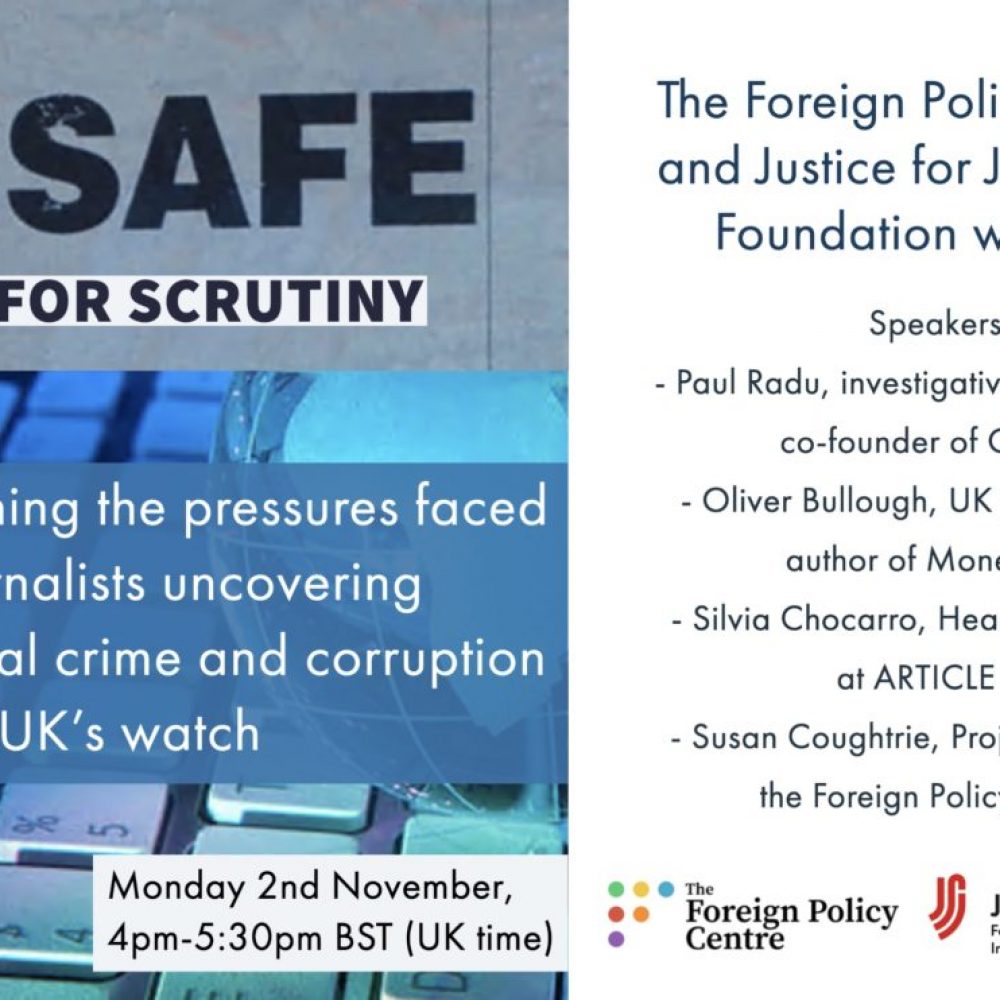The Foreign Policy Centre’s new Unsafe for Scrutiny: Examining the pressures faced by journalists uncovering financial crime and corruption around the world report presents the findings of a global survey conducted in September – October 2020.
The aim of the survey was to uncover the scope and scale of risks and threats facing investigative journalists across the world who have been targeted for uncovering financial crime and corruption, and was supported by the Organized Crime and Corruption Reporting Project (OCCRP), the International Consortium of Investigative Journalists (ICIJ) and the Global Investigative Journalism Network (GIJN).
63 in investigative journalists from 41 countries participated in the survey.
“Investigative journalists uncovering financial crime and corruption are being subject to a significant amount of risks and threats, which has a chilling effect on their ability to continue to bring crucial matters of public interest to light. Particularly alarming is the level and frequency, as highlighted by our survey, of legal threats being sent to journalists all over the world. The UK is the highest international source of these legal challenges – almost as high as EU countries and the US combined – which points to a clear need for further review to prevent potential vexatious misuse of the UK legal system.” – Susan Coughtrie, Project Director at the Foreign Policy Centre.
Key findings of the report:
- The majority (71%) of respondents reported experiencing threats and/or harassment while working on investigations into financial crime and corruption.
- Of those, almost all had been subject to verbal threats (81%), trolling on social media (79%) and written threats (70%).
- Civil legal cases, especially the use of cease and desist letters, surveillance, both on and offline, interrogation by authorities and smear campaigns, were also experienced by more than 50% of these respondents.
- Incidences of threats or harassment with that have notable psychological impact – such as trolling, verbal and written threats, smear campaigns, and blackmail – were the most highly reported (35% of all incidences reported).
- Legal threats were strongly highlighted by survey respondents as an area of particular concern. 73% of all respondents experiencing threats had received communication(s) threatening legal action as a result of information they had published. The United Kingdom (UK) was by far the most frequent country of origin for legal threats, other than the journalists’ home countries. The UK was almost as frequently a source of these legal threats as the European Union (EU) countries and the United States combined. Defamation pursued as a civil case was by far the most frequently given reason behind legal communication(s) to respondents (91%).
- At least 61% of respondents also reported their investigations had uncovered a link (directly or indirectly) with UK financial and legal jurisdictions.
- The resources that respondents identified as the most valuable while reporting on financial crime and corruption also overlapped with those they identified as the most lacking, namely legal aid and counsel, financial support and whistleblower protections.
The survey findings are complemented with a section specifically on international standards on safety of journalists, which examines the obligation of states to protect all journalists from threats written by Silvia Chocarro, Head of Protection at ARTICLE 19.
This report is being launched with a webinar on Monday 2nd November, the International Day to End Impunity for Crimes Against Journalists, with the following speakers: Paul Radu (investigative journalist and co-founder of OCCRP), Oliver Bullough (UK journalist and author of Moneyland), Sarah Clarke (Head of Europe and Central Asia at ARTICLE 19) and Susan Coughtrie (Project Director at the Foreign Policy Centre).
What people are saying about the report:
“This report places a spotlight on a huge problem affecting investigative reporting today. Organized crime and corrupt politicians are doing everything in their power to stop us from informing the public. They are scared of thorough, cross border reporting that impairs their abilities to conduct corrupt business as usual,” said Paul Radu, investigative journalist and co-founder of the Organised Crime and Corruption Reporting Project (OCCRP).
***
“While progress is being made at the EU level to combat SLAPPs, there is serious cause for concern that without adequate reform of the UK libel industry, cross border legal cases – which we know emanate disproportionately from London – will continue to pose a major threat to international journalists reporting on financial crime and exposing corruption. This report makes the case even clearer of the urgent need for reform. In allowing this abuse to continue, the UK government is not living up to its own stated commitments to protecting media freedom,” said Sarah Clarke, Head of Europe and Central Asia at ARTICLE 19, an international organisation campaigning for freedom of expression and right to information.
FPC’s project ‘Unsafe for scrutiny: How journalists around the world investigating financial crimes in UK jurisdictions face risks to their freedom and security from vexatious lawsuits (SLAPP) to violence,’ is being kindly supported by the Justice for Journalists Foundation.
For any queries, please contact Susan Coughtrie on susan.coughtrie@fpc.org or +447887534165.

